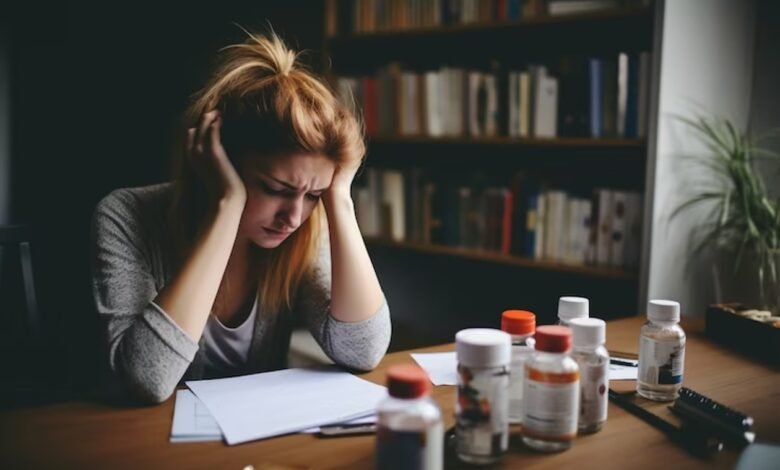How to Diagnose Depression: Symptoms, Tests, and More

In today’s fast-paced world, it’s common for people to experience occasional feelings of sadness or melancholy. However, when these feelings persist, intensify, and interfere with daily life, it may be a sign of clinical depression. Diagnosing depression is a critical step towards seeking help and finding effective treatment. This article will guide you through the process of diagnosing depression, including recognizing its symptoms, understanding the available tests, and seeking professional help.
Understanding Diagnose Depression
Depression is a complex and prevalent mental health condition that affects millions of people worldwide. It’s essential to comprehend its nature, symptoms, and potential impact on individuals’ lives to promote awareness and provide support to those who may be struggling.
What is Depression?
Depression, also referred to as major depressive disorder (MDD), is a mood disorder characterized by persistent feelings of sadness, hopelessness, and a profound loss of interest or pleasure in activities that were once enjoyable. It is more than just experiencing occasional sadness; it is a pervasive and often debilitating condition that can affect various aspects of a person’s life, including their thoughts, emotions, and physical well-being.
Read More: Navigating the Depths of Depression: A Journey towards Mental Wellness
The Types of Depression
Depression is not a one-size-fits-all condition. It presents itself in several distinct forms, each with its own set of characteristics and symptoms:
- Major Depressive Disorder (MDD): This is the most common form of depression and involves a persistent low mood, along with a range of physical and emotional symptoms.
- Persistent Depressive Disorder (PDD): Also known as dysthymia, this form of depression is characterized by a chronic but less severe low mood that lasts for at least two years.
- Bipolar Disorder: Individuals with bipolar disorder experience extreme mood swings, including periods of diagnose depression and manic episodes marked by heightened energy and impulsivity.
- Seasonal Affective Disorder (SAD): SAD is a type of diagnose depression that occurs seasonally, typically during the fall and winter months when there is less natural sunlight.
Recognizing the Symptoms
To diagnose depression, it’s crucial to recognize its symptoms, which can vary from person to person. Common symptoms include:
- Persistent Sadness: Overwhelming and enduring feelings of sadness, emptiness, or hopelessness.
- Loss of Interest: A lack of enthusiasm or interest in activities that were once enjoyable.
- Fatigue: An ongoing sense of tiredness or low energy, even after rest.
- Changes in Appetite: Significant weight loss or gain due to changes in eating habits.
- Sleep Disturbances: Difficulty falling asleep, staying asleep, or oversleeping.
- Difficulty Concentrating: Trouble focusing, making decisions, or remembering things.
- Feelings of Worthlessness: A pervasive sense of guilt, self-criticism, or feelings of being a burden.
- Thoughts of Death or Suicide: Persistent thoughts of self-harm or suicide, which require immediate attention.
The Impact on Physical Health
Depression isn’t limited to emotional and cognitive symptoms; it can also manifest physically. Many individuals with diagnose depression report experiencing physical symptoms such as headaches, stomachaches, and unexplained aches and pains. These physical symptoms are often intertwined with the emotional aspects of depression, further emphasizing its comprehensive impact.
Understanding depression is the first step towards seeking help and support. If you or someone you know is experiencing symptoms of diagnose depression, it’s essential to reach out to a mental health professional. Depression is a treatable condition, and with the right guidance and support, individuals can embark on a journey towards recovery and improved well-being. Remember, seeking help is a courageous step towards a brighter future.
Recognizing the Symptoms
Recognizing the symptoms of depression is crucial for early intervention and seeking the necessary support and treatment. Depression can manifest differently in individuals, but there are common signs to look out for:
Persistent Sadness: One of the hallmark signs of diagnose depression is an overwhelming and persistent feeling of sadness. It’s not just about feeling down for a day or two; it’s a deep, enduring sense of unhappiness.
Loss of Interest: Individuals with depression often lose interest in activities they once enjoyed. Hobbies, social interactions, and even daily tasks may become burdensome.
Fatigue: A pervasive sense of fatigue and low energy is a common symptom. Even after a full night’s sleep, a person with depression may still feel tired.
Changes in Appetite: Depression can lead to significant changes in appetite. Some people may lose their appetite and experience weight loss, while others may turn to comfort eating and gain weight.
Sleep Disturbances: Sleep patterns are often disrupted in depression. Insomnia, characterized by difficulty falling asleep or staying asleep, is common. On the flip side, some individuals may experience excessive sleeping and find it hard to get out of bed.
Difficulty Concentrating: Depression can affect cognitive function, making it challenging to concentrate, make decisions, or remember things. This can impact work, study, and daily life.
Feelings of Worthlessness: Many people with diagnose depression experience a deep sense of worthlessness or excessive guilt. They may harshly criticize themselves and believe they are a burden to others.
Thoughts of Death or Suicide: Perhaps the most critical symptom to address is persistent thoughts of death or suicide. If you or someone you know is experiencing these thoughts, it’s essential to seek immediate help. Contact a mental health professional or a crisis helpline.
It’s important to note that depression is not always solely emotional; it can also have physical manifestations, such as:
Physical Aches and Pains: Some individuals with depression report unexplained physical symptoms like headaches, stomachaches, or muscle pain.
If you or someone you know is displaying these symptoms, it’s essential to reach out to a mental health professional or a healthcare provider. diagnose depression is a treatable condition, and early intervention can make a significant difference in one’s journey toward recovery and improved mental well-being. You are not alone, and help is available to guide you through this challenging time.
Physical Symptoms
Depression can also manifest physically, leading to headaches, stomachaches, and other unexplained physical discomforts.
Diagnostic Tests
Self-Assessment Questionnaires
Mental health professionals often use self-assessment questionnaires like the PHQ-9 or Beck Depression Inventory to evaluate the severity of depressive symptoms.
Clinical Interviews
A face-to-face interview with a mental health professional can help assess symptoms, their duration, and their impact on daily life.
Medical Tests
In some cases, medical conditions like thyroid disorders can mimic depressive symptoms. Blood tests may be necessary to rule out such conditions.
Seeking Professional Help
Depression is a complex and challenging condition that often requires professional intervention and support. If you or someone you know is experiencing symptoms of depression, it’s essential to take proactive steps to seek help. Here are key aspects of seeking professional assistance:
The Role of a Therapist
Therapists, also known as counselors or psychotherapists, play a crucial role in the diagnosis and treatment of depression. Here’s what you can expect when working with a therapist:
- Assessment: A therapist will conduct an initial assessment to understand the nature and severity of your depression. This assessment may involve questions about your symptoms, personal history, and life circumstances.
- Talk Therapy: Therapists use various talk therapy techniques to help individuals explore their thoughts, emotions, and behaviors. Cognitive-behavioral therapy (CBT) and interpersonal therapy are common approaches for treating depression.
- Creating Coping Strategies: Therapists work with clients to develop effective coping strategies and tools for managing depressive symptoms. They teach techniques for challenging negative thought patterns and promoting emotional well-being.
- Support and Empathy: A therapist provides a safe and empathetic space for individuals to express their feelings and concerns. This emotional support is instrumental in the healing process.
Medication
In some cases, especially when depression is severe or not responsive to therapy alone, psychiatrists may recommend medication as part of the treatment plan. Commonly prescribed medications for diagnose depression include:
- Antidepressants: These medications work to balance brain chemicals (neurotransmitters) that influence mood. It’s essential to consult a psychiatrist who can determine the most suitable medication and monitor its effects.
- Regular Monitoring: If prescribed medication, individuals will typically have follow-up appointments with their psychiatrist to assess the medication’s effectiveness and address any side effects.
Lifestyle Changes
In addition to professional help, making positive lifestyle changes can significantly impact depression management. Here are some strategies:
- Regular Exercise: Engaging in physical activity releases endorphins, which are natural mood lifters. Regular exercise can help reduce depressive symptoms.
- Balanced Diet: Eating a well-balanced diet rich in nutrients can support overall mental health. Some individuals may benefit from dietary changes or supplements.
- Adequate Sleep: Establishing a regular sleep pattern and ensuring sufficient sleep can improve mood and energy levels.
- Stress Reduction: Learning stress management techniques such as mindfulness meditation, yoga, or deep breathing exercises can help alleviate depressive symptoms.
- Social Support: Maintaining connections with friends and loved ones can provide emotional support and reduce feelings of isolation.
Seeking professional help for depression is not a sign of weakness; it’s a courageous step toward regaining control of your life and emotional well-being. diagnose depression is treatable, and with the right support, individuals can experience significant improvement in their symptoms and overall quality of life.
Remember that you don’t have to face diagnose depression alone. Reach out to a mental health professional, share your concerns with friends and family, and build a support network to help you on your journey to recovery.
Read More: Physical Activity and Mental Health: Exploring the Connection
Conclusion
Diagnosing depression and seeking professional help is a critical journey toward regaining control over one’s life and mental well-being. Depression is a common and treatable condition, and understanding its symptoms and seeking assistance are pivotal steps in the recovery process.
diagnose depression, characterized by persistent sadness, loss of interest, and various physical and emotional symptoms, can affect individuals in different ways. Recognizing these symptoms is the first step towards addressing the condition effectively.
Once symptoms are acknowledged, it’s imperative to seek professional help. Therapists and counselors provide valuable support through assessments, talk therapy, and the development of coping strategies. Medication, when prescribed by a psychiatrist, can also play a vital role in managing severe depression.
FAQs
Is depression treatable?
Yes, depression is treatable, and various therapies and medications can help manage its symptoms effectively.
How long does it take to diagnose depression?
The time it takes to diagnose depression varies, but seeking help early can lead to faster recovery.
Can I self-diagnose depression?
While self-assessment tools can provide insights, it’s crucial to consult a mental health professional for a formal diagnosis.
Are there alternative therapies for depression?
Yes, alternative therapies such as acupuncture, yoga, and mindfulness meditation can complement traditional treatments.
What if I can’t afford therapy or medication?
Many communities offer low-cost or sliding-scale mental health services, and nonprofit organizations can provide support for those with limited resources.







